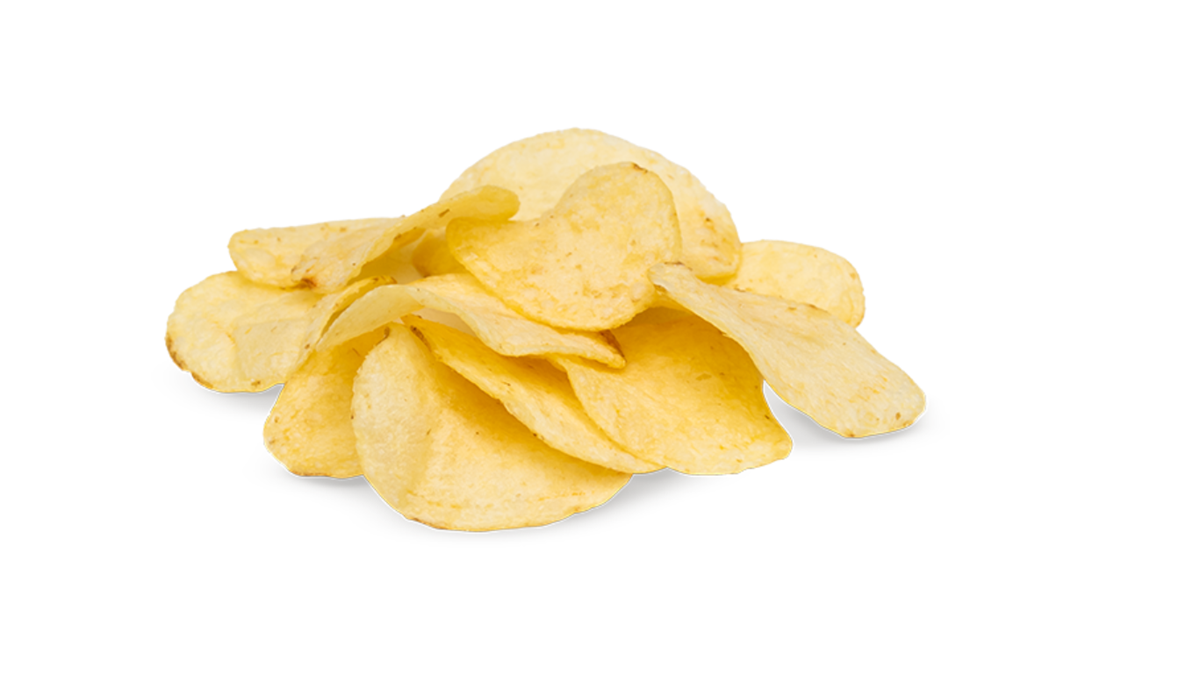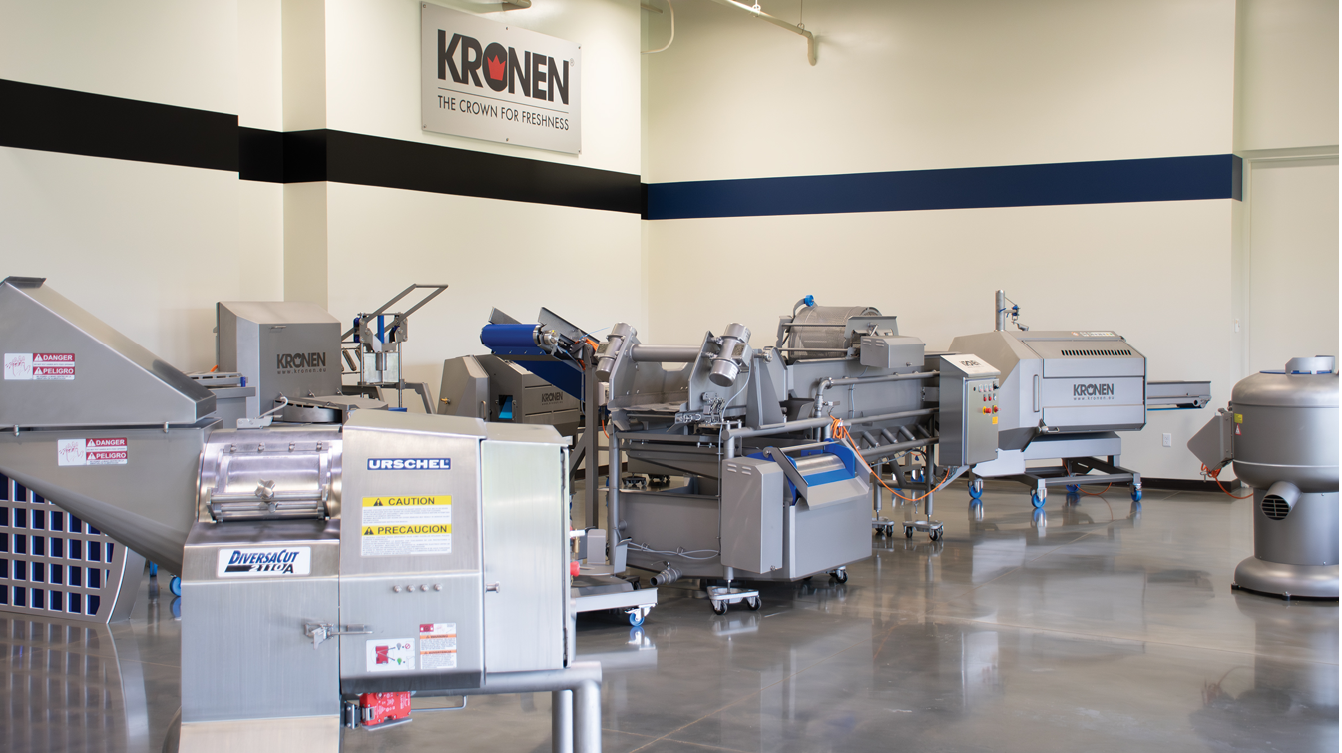Processing
Factory of the future
As the recognized global leader in industrial food cutting technology, URSCHEL is continuously adapting to the everchanging needs of processors. As an engineering/manufacturing company, every part and every process behind each part is consistently reviewed and refined. With so many capabilities under one roof, valuable developments and improvements are fast-tracked. Constantly partnering with processors and line builders, Urschel readily implements new methods and efficiencies to benefit the overall production line-up, both upstream and downstream from Urschel cutting equipment. As businesses slowed due to the COVID-19 pandemic, many processors delved more deeply into the needs of their daily operations. Production lines functioned with a reduced workforce. Processors oftentimes ordered additional spare parts to keep at the ready, not knowing what to expect. Others looked more deeply into R&D. Processors are eager to look past the pandemic and toward the future. Knowledge learned during COVID-19 time will shape future decisions. As they look to the future to determine how their businesses may evolve, there is much to evaluate. With so many different styles of potato products, there are a wide gamut of potato production facilities around the world. Production and needs vary from regional processors to global, mega-processors. Future decisions will be as diverse as the operations themselves.
26 April, 2021
As the recognized global leader in industrial food cutting technology, URSCHEL is continuously adapting to the everchanging needs of processors. As an engineering/manufacturing company, every part and every process behind each part is consistently reviewed and refined. With so many capabilities under one roof, valuable developments and improvements are fast-tracked. Constantly partnering with processors and line builders, Urschel readily implements new methods and efficiencies to benefit the overall production line-up, both upstream and downstream from Urschel cutting equipment. As businesses slowed due to the COVID-19 pandemic, many processors delved more deeply into the needs of their daily operations. Production lines functioned with a reduced workforce. Processors oftentimes ordered additional spare parts to keep at the ready, not knowing what to expect. Others looked more deeply into R&D. Processors are eager to look past the pandemic and toward the future. Knowledge learned during COVID-19 time will shape future decisions. As they look to the future to determine how their businesses may evolve, there is much to evaluate. With so many different styles of potato products, there are a wide gamut of potato production facilities around the world. Production and needs vary from regional processors to global, mega-processors. Future decisions will be as diverse as the operations themselves. Analytical efficiences More customers are becoming aware of the overall analysis of plant line operations. Processors may choose to embrace gathering of analytical data. The more data that is gathered, the more in-depth decisions may be possible to increase plant efficiencies. The goals may be straightforward or more elaborate. The first step is to determine what types of improvements are necessary and to ascertain how to quantify the various objectives. The collection of any data should be backed by a concrete purpose. Gathering of data is futile without a comprehensive plan. Mega-processors have the capability to analyze the solid nature of the potatoes, water use, starch loss, cut quality, and multiple comparables to increase cut quality, evaluate sharpness and life of different knife blades, and determine cost analysis across the production line. As a processor grows in volume, the customer may choose to invest with the help of a line builder to increase electronic sensors and gather analytics at each step of the line. Analysis of data to determine an upgrade in technology may be simple or more complex. For example, in the case of a number of kettle chip processors who performed a side-by-side comparison for kettle fill times between the Urschel standard 8-station head versus the MicroAdjustable SL14-station head. Calculations based on number of batches and fill times were easily achieved. Further cost analysis and comparison of maintenance procedures and time yielded upgrading to a newer technology the 14-station head as a logical next step to improve the line. Upgrading technology in one area of the line, may lead to changing out of other stations. For example, standard chippers updating to the SL14 slicing head, in some cases, purchased larger capacity downstream equipment, such as fryers. Technology in processingUpgrading technology to improve the quality of the end-product is a consideration. Processors are currently incorporating PEF (Pulse Electric Field) Processing. This process replaces or reduces the need to blanch or to preheat treat. Pulsing electric waves move through the cell walls of potatoes. These waves perforate the cell membrane to create microscopic holes to release sugar and amino acid. This reduces acrylamide and lowers oil content. Effectively softening the potato reduces impact during the cutting process to promote increased knife life and decrease costs. Conditioning the potato increases product permeability resulting in less product breakage and more in-spec product. Use of ScrapCost efficiencies are linked to a number of variables. Items on a spreadsheet, such as cost of oil and potatoes. The type of potato being processed. The type of potato sold for chips/crisps is more expensive than the type sold for fries. Could this change in the future? Fry producers repurpose scrap into a multitude of other value-added potato products. Building on these products will continue to deliver strong profits in subsequent years. The Comitrol® Processor series line by Urschel will remain a popular option for the further reduction of potatoes. With several different models from which to choose, products may be reduced to coarse or fine purees. The line focuses on particle size reduction. A reduction head in a fixed position works with a high-speed impeller that precisely and incrementally shears the product to a specified target size. Valuable operator resources Labor and skill level is an ongoing topic. The necessity to manufacture operator friendly capital machinery. Equipment operating at the push of a button with uninterrupted capability and limited downtime will remain preferred. Parts on cutting machinery are manufactured for quick, simple changeovers with built-in features, such as handles. This trend will continue. Simplifying the ability to run a line, limiting personnel and the skill level required, and manufacturing longer running machines with even more durable components is essential as time goes on. Other items like trolleys and types of stands will continue to be designed to expedite routine maintenance. Urschel will continue to supply operator resources to assist lines with timesaving efficiencies.












